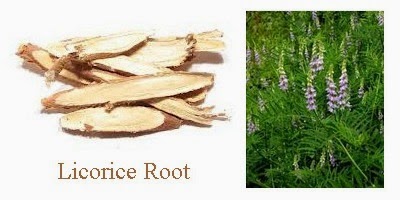Licorice root (Glycyrrhiza glabra) - Licorice root (the ingredient in black licorice) is a substance of which virtually everyone is aware. Licorice is a perennial herb native to the Mediterranean region. Oriental cultures recognize licorice for its sweetening properties. Glycyrrhizin, the active ingredient in licorice, is between 50 to 100 times sweeter than sucrose.
Parts of Licorice Used: You can use the whole root (with skin or peeled), the dried powder, or the extract to naturally sweeten the things you eat and drink. It takes very little to attain sweetness. Many over-the-counter combination herbal teas sweeten and flavor their formulas with licorice.
The blue-flowering plant, which looks like a pea vine, grows wild in much of southern Europe and in Asia. Licorice is one of the most widely used medicinal herbs and is found in numerous traditional formulas in many cultures because it also covers up the gross taste of other herbs.
Uses of Licorice root: Licorice root has been used since ancient Egyptian times to treat upset stomachs, ulcers, asthma, chest infections, bronchitis and coughs. It is also good for clearing the throat, supporting adrenal function, arthritis and as is a mild laxative. Licorice root roots and stolons (peeled or unpeeled) may be used in its unadulterated, ground-up form as a primary sweetening compound. Licorice contains glycyrrhizic acid (also knows as glycyrrhizic or glycyrrhizin.
Glycyrrhizic acid is often touted as an ulcer-healing agent (although my clients hated it, so I no longer send it home with them. I also don't ask them to chew the tablets.) In one clinical study, licorice root fluid extract was used to treat 100 patients with early peptic ulcer. Eighty six cases that had been unresponsive to conventional treatment were treated at a dose of 15 ml (about one tablespoon extract) four times daily for six weeks. Positive effects were reported in 90% of the cases.
Licorice overdose: The bad thing about licorice is that it causes sodium retention which then raises blood pressure causing hypertension. Licorice acts to retain water in the body. Because of this, it can be a good herb for diabetes insipidus patients where the person can't seem to drink enough water.
Other side effects include edema, headaches, lethargy, and mild depletion of potassium which may result in cardiac problems when consumed excessively. Adverse symptoms of excessive glycyrrhizin consumption generally disappear shortly after a person lowers their dietary intake of products containing the sweetener.
Contraindications: Licorice root should not be used for people or pets suffering with cholestatic liver disorders, liver cirrhosis, hypertonia, hypokalemia, severe kidney insufficiency. It should not be used in women who are pregnant as it can cause an increase in blood pressure, but it is OK to use during lactation.
Case Study: I had just learned how great licorice root was for ulcers from one of the herb distribution companies when I first started practicing natural medicine, so I ordered a couple bottles of the deglycyrrhizinated licorice (DGL) which is supposed to have fewer side effects if overdose occurs. Within a week, I had two ulcer cases that week, which is usually the synchronistic way things happen in my life.
I didn't hear back from the first client, but the second client brought her bottle back to me, almost completely full.
"Have you ever tried these?" She asked. "Well, no, I don't have ulcers, but I do try anything I send home with cats as they won't tolerate much and you have to be particular with what you sent home with them."
"Well, you are going to try one now." She said assertively as she opened the bottle and whipped out one of those stinky little pills.
I popped one into my mouth and chewed. "Woof!" I said, as I made a dash to the sink to wash my mouth out. "I had NO idea!"
I refunded her money and learned a lot from that woman. I guess you have to use licorice root in very small doses! I'm not so keen on sending home awful tasting stuff with clients any more. I'd rather send capsules and homeopathic formulas home which taste better. Some herbalists say capsules don't work as well, but if you can't gag something down, and it stays on your shelf the entire month, it's not going to do you any good at all for correcting the challenge you came to see me for in the first place! I think I'll just stick to eating the occasional piece of black licorice candy! I like the organic Panda brand you get at the local health food store.
Here's an interesting licorice fact: Millions of pounds of licorice are imported into the United States each year, about 90% for use in flavoring tobacco products. Bizarre, huh? I wonder if smoking it causes high blood pressure...
Dr. Denice Moffat is a practicing naturopath, medical intuitive, and veterinarian working on the family unit (which includes humans and animals) through her telephone consultation practice established in 1995. She has a content-rich website at http://www.NaturalHealthTechniques.com. Sign up for her free internationally distributed newsletter to receive a bonus report containing over 150 tips to improve your health starting today or follow her on Facebook for all the latest health updates and discussions at http://www.facebook.com/NaturalHealthTechniques.
Article Source: http://EzineArticles.com/?expert=Denice_Moffat
licorice root extract licorice root tea
No comments:
Post a Comment